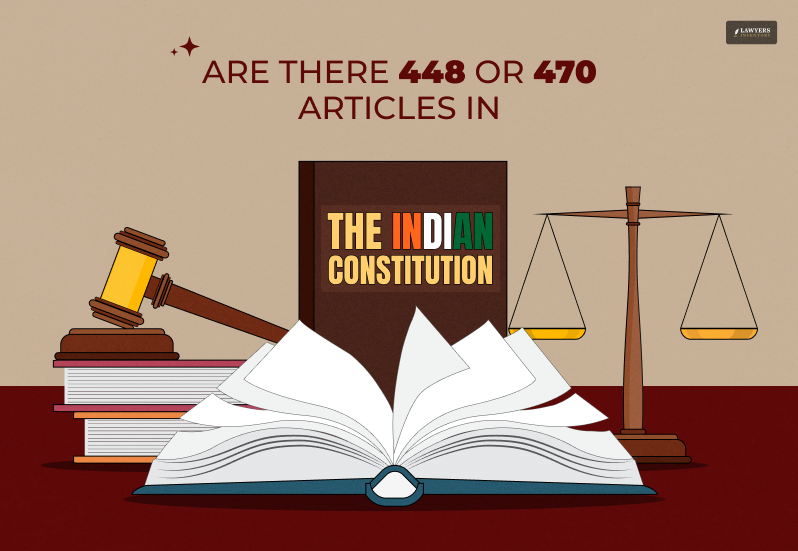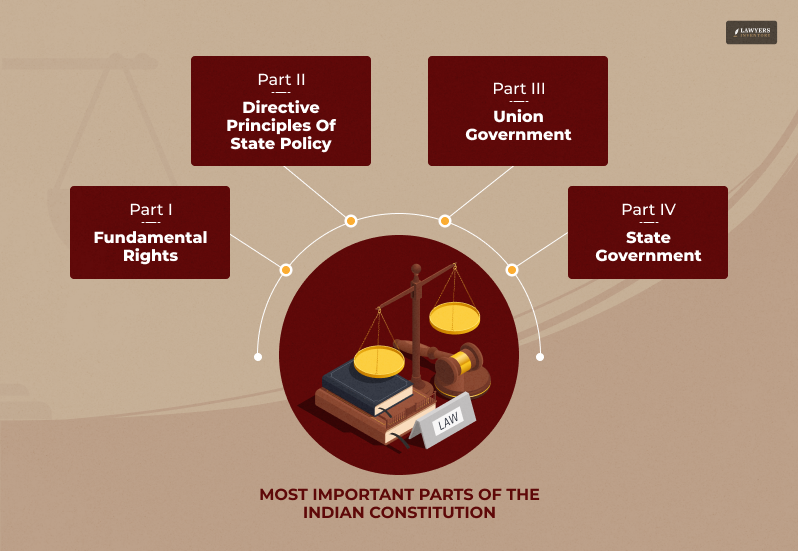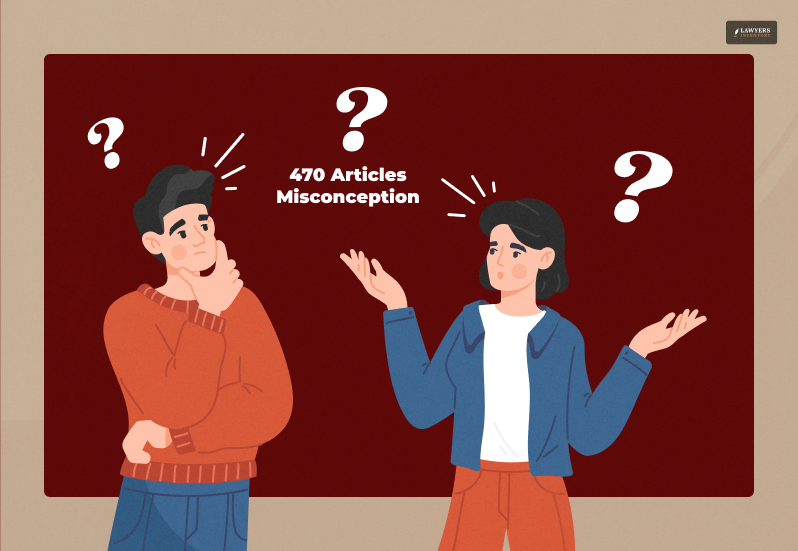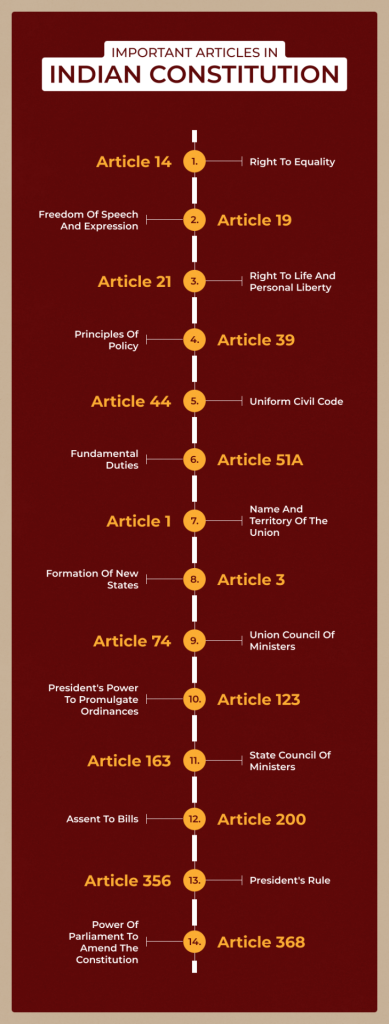
Wondering whether there are 448 or 470 Articles in Indian Constitution? You’re definitely not the only one scratching your head over this.
Let’s face it—India’s Constitution is a pretty massive document. It officially came into effect on January 26, 1950. And since then, it’s been the ultimate rulebook for the country. Like literally!
It lays down everything from your basic rights to how the government works, what its powers are, and even what your responsibilities as a citizen might be.
Now, what a lot of people might not know is the fact that originally, it had 395 articles spread across 22 parts and 8 schedules. However, over the decades, things have changed.
How?
Well, for those who don’t know, it’s through:
- Amendments.
- Revisions.
- Additions.
And quite naturally, that’s made the article count a little confusing. So, if you’re stuck between 448 and 470 and not sure what’s right, you’re in the right place.
Hi. In today’s blog, I will be answering one of the most asked questions: Are there 448 or 470 Articles in Indian Constitution?
So, keep on reading this blog till the end and thank me later…
Are There 448 or 470 Articles in Indian Constitution?
Over time, India’s Constitution has been amended several times. With each update, the structure evolved. Because of this, some people and sources mistakenly believe the Constitution now has 470 articles.
To set the record straight: the correct number is 448. That includes all the amendments up to today.
It’s not just a trivia fact—it matters. Especially if you’re studying law, working in the legal field, or just someone who enjoys understanding how this country runs.
So, let’s dig into where this confusion comes from and what the actual structure looks like now.
The 448 Articles: The Real Number of Articles

The Indian Constitution is made up of 22 parts. Each part has articles that focus on a particular theme or section of governance.
This breakdown is what keeps things (somewhat) simple. It helps organize the sea of information in a logical way, so if you’re trying to understand how something works—like voting rights or government structure—you know exactly where to look.
Let’s take a look at how these parts are laid out.
Part I: Fundamental Rights
Okay, so Articles 1 to 51 fall under what we call Part I, and they’re all about fundamental rights—things the government can’t take away from you.
These include stuff like:
- Right to Equality.
- Right to Freedom.
- Freedom of Religion.
- Cultural & Educational Rights.
- Right against Exploitation.
Part II: Directive Principles of State Policy
Next up, Articles 36 to 51A talk about Directive Principles. Think of these like the government’s to-do list. They’re not enforceable by law, but they guide lawmakers to build a better, fairer society.
Some key ones:
- Social & Economic Justice.
- Political Justice.
- Secularism.
- Environmental Responsibility.
Part III: Union Government
Articles 52 to 151 focus on the Union Government—the folks running things at the national level. This section outlines the powers and duties of the President, Prime Minister, Council of Ministers, and Parliament.
Part IV: State Government
Then you’ve got Articles 152 to 237. These focus on the State Governments—how they’re structured, who’s in charge, and how they interact with the central government.
It covers Governors, Chief Ministers, and State Legislatures.
Other Parts
Beyond these, the Constitution dives into areas like the judiciary, emergency provisions, finance, trade, and elections. Important stuff is scattered throughout. For instance, Article 326? That’s where your right to vote lives.
The 470 Articles Misconception

Now let’s tackle that 470 number. Why do some people think that there are 470 articles? So, where did it come from?
TBH, it’s probably from a mix of things. Like? Well, these can be from:
- Outdated books.
- Misinterpretations.
- People counting amendments and schedules as separate articles.
But here’s the thing: when the Constitution is amended, we don’t add new articles as standalone pieces. We usually insert or tweak sections within the existing ones.
Some folks count every single amendment, schedule, and appendix, and that’s how they arrive at the 470 number.
But those aren’t new articles. They’re simply updates or supplementary content. Want me to give you an example? I heard you!
For example:
- Schedules list out things like official languages, states, or electoral procedures.
- Appendices might include extra info or clarifications.
They’re important, sure. But they’re not part of the core article count.
So even though you might see “470” floating around, it’s not accurate if you’re talking strictly about the articles. The number stays at 448.
Most Important Articles in the Indian Constitution

Constitution has a lot of articles but only a few of them are the most important ones. These are like the main ones. THESE are definitely the ones you need to know.
Let’s have a look at some of them.
Fundamental Rights (Articles 12–35)
- Right to Equality (Article 14): Nobody has the right to discriminate against any person under the law.
- Freedom of Speech (Article 19): You have the right to freedom of speech, movement, and expression but only to the extent that it does not violate the rights of others.
- Right to Life and Liberty (Article 21): The scope of this right has been also defined as privacy, pure environment, etc.
Directive Principles (Articles 36–51)
- Article 39: It describes the fair distribution of resources and equal rights to men and women.
- Uniform Civil Code (Article 44): This article states that all citizens must have one set of laws besides religion.
Fundamental Duties (Article 51A)
This article recollects people their obligations, such as respecting the national flag, protecting public property, and promoting peace.
The Union & Its Territory (Articles 1–4)
- Article 1: States that India is a Union of States.
- Article 3: Allows Parliament to create new states or change the existing state’s boundaries.
The Union Government (Articles 52–151)
- Article 74: Describes the Council of Ministers.
- Article 163: Council of Ministers at the state level, which is headed by the Chief Minister.
- Article 200: Governor’s function in giving consent or withholding bills.
- Article 356: It is a popular term for the President’s Rule. The President has the power to take over the state if it is not functioning properly.
So, What’s The Correct Number?
To wrap it up—there are 448 articles in the Indian Constitution. Not 470.
The inflated number often comes from folks counting other parts, like schedules or amendments, separately. But those don’t add to the article count.
Hopefully, this post cleared up the confusion. Got more questions? Feel free to drop them in the comments or reach out. Always happy to help clarify stuff like this!
Read More…
- What Is Meant By Big Law? A Guide
- Choosing the Right Law Firm: Things You CANNOT Miss!
- Looking For An Excellent Lawyer: Here Is How You Should Begin To Find A Lawyer












0 Reply
No comments yet.